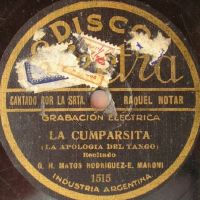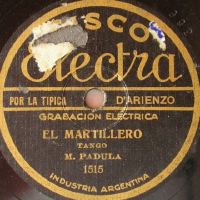| Style, recording date and record number
|
Singer(s)
|
Title and authors |
|
Tango
1928 (769)
|
Carlos Dante
|
Callejas Solo
(J. D'Arienzo, L. Rubistein) |
Dedicated to Alfredo Callejas.
The music will later be reused with other lyrics: "Nada Más"
|
Tango
1928 (770)
|
Carlos Dante
|
Puro Grupo
(C. Ortiz, J.J. Garrón) |
|
Tango
1928 (770)
|
Carlos Dante
|
Quejas Del Suburbio
(A. Polito, S. Polito) |
|
Tango
1928 (769)
|
Carlos Dante
|
Juguete
(S. Grupillo, N. Primiani) |
|
Tango
1928 (768)
|
Carlos Dante
|
Funyi Claro
(N. Vaccaro, E.E. Méndez) |
|
Tango
1928 (768)
|
Carlos Dante
|
Esta Noche Me Emborracho
(E.S. Discépolo) |
|
Tango
1928 (772)
|
|
Pebetita
(S. Polito) |
|
Tango
1928 (772)
|
Carlos Dante
|
La Otra Noche
(A. Romano) |
|
Tango
1928 (767)
|
Carlos Dante
|
Sandía Calada
(A. Aieta) |
|
Tango
1928 (773)
|
Carlos Dante
|
Chorra
(E.S. Discépolo) |
|
Tango
1928 (773)
|
Carlos Dante
|
Era Un Rincón De Alegría
(L.N. Visca) |
|
Tango
1928 (767)
|
Carlos Dante
|
Siga La Farra
(P. De Luca) |
|
Tango
1928 (776)
|
Carlos Dante
|
Pobre Cieguita
(J.C. Sanders, C.F. Védani) |
|
Tango
1928 (776)
|
Carlos Dante
|
Por Ella Ten Piedad
(A. Polito) |
|
Tango
1928 (777)
|
Carlos Dante
|
La Muchacha Del Circo
(G.H. Matos Rodríguez) |
|
Tango
1928 (777)
|
Carlos Dante
|
Engominado
(F. Montoni) |
|
Tango
1928 (778)
|
Carlos Dante
|
Volvé Al Cotorro
(A. Scarpino, C.C. Du Herme) |
"Carlos Du Herme" as written on the music sheet cover, elsewhere "Duerme" is mentioned
|
Tango
1928 (778)
|
Carlos Dante
|
Medianoche
(A. Tavarozzi, E.E. Méndez) |
|
Tango
1928 (785)
|
Carlos Dante
|
Máscaras
(P.P. Vilella, L. Rubistein) |
|
Tango
1928 (788)
|
Carlos Dante
|
Fueye Querido
(A. Polito) |
|
Tango
1928 (785)
|
Carlos Dante
|
Acordate Lo Que Fuiste
(P. Toscano) |
|
Tango
1928 (788)
|
Carlos Dante
|
Muchachas Cuidado
(A. Polito) |
|
Tango
1928 (784)
|
Carlos Dante
|
Qué Vachaché
(E.S. Discépolo) |
|
Tango
1928 (784)
|
Carlos Dante
|
Por Mishé
(L. Moresco) |
|
Tango
1928 (789)
|
Carlos Dante
|
Ilusiones
(G. Clemensi) |
|
Tango
1928 (789)
|
Carlos Dante
|
Reite Mujercita
(J. Rodríguez) |
|
Tango
1928 (790)
|
Carlos Dante
|
Pa'Que Pensás
(A. González) |
|
Tango
1928 (791)
|
Carlos Dante
|
La Cumparsita
(G.H. Matos Rodríguez) |
The estribillo ("Mis amigos ya no vienen...") comes from
the lyrics by Contursi and Maroni ("Si supieras...") |
Tango
1928 (790)
|
Carlos Dante
|
Pálida Silueta
(N. Primiani) |
|
Tango
1928 (791)
|
Carlos Dante
|
No Te Engañes Corazón
(R. Sciammarella) |
|
Tango
1928 (794)
|
Carlos Dante
|
Chirusa
(J. D'Arienzo, N. López) |
The estribillo
seems to be different from the lyrics used in later recordings and also
from the version by Carlos Dante (with guitar accompaniment) of that
same year.
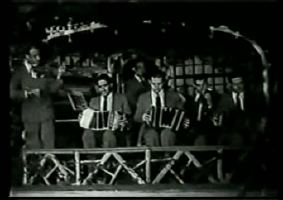 "Chirusa" was also played by the D'Arienzo orchestra in "Tango"
(1933), the first Argentinian feature-length sound film. We can see
D'Arienzo (left) still playing the violin. Watch the fragment on Youtube. "Chirusa" was also played by the D'Arienzo orchestra in "Tango"
(1933), the first Argentinian feature-length sound film. We can see
D'Arienzo (left) still playing the violin. Watch the fragment on Youtube.
|
Tango
1928 (794)
|
Carlos Dante
|
Llevátelo Todo
(R. Sciammarella) |
|
Tango
1929 (799)
|
Francisco Fiorentino
|
Victoria
(E.S. Discépolo) |
|
Ranchera
1929 (799)
|
Francisco Fiorentino
|
Maíz Frito
(M.V. Cabral, A. Villader) |
Voice over by Martín V. Cabral |
Tango
1929 (801)
|
Francisco Fiorentino
|
Noche Silenciosa
(F. Lauro) |
|
Ranchera
1929 (801)
|
Francisco Fiorentino
|
Fiesta, Asao Y Cimarrón
(F. Lauro, M.V. Cabral) |
Voice over by Martín V. Cabral |
Tango
1929 (802)
|
Francisco Fiorentino
|
Soy Un Arlequin
(E.S. Discépolo) |
|
Ranchera
1929 (800)
|
Francisco Fiorentino
|
Al Tranquito
(M.V. Cabral) |
Voice over by Martín V. Cabral |
Tango
1929 (800)
|
Francisco Fiorentino
|
Pilchas Fuleras
(A.B. Fernández, F. de Gregorio) |
|
Ranchera
1929 (802)
|
Francisco Fiorentino
|
La Correntina
(M.V. Cabral) |
Voice over by Martín V. Cabral |
Tango
1929 (807)
|
Francisco Fiorentino ?
see note
|
Ché Careta
(S. Pabrio, D. Renis) |
In his Francisco Fiorentino discography, R.G. Miglio claims that these 2 tangos (Ché, Careta -
Mala) are often ascribed to Francisco Fiorentino whereas the singer is
in fact unknown ("cantor sin identificar").
|
Tango
1929 (807)
|
Francisco Fiorentino ?
see note
|
Mala
(J.J. Visciglio, L. Rubistein) |
|
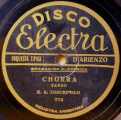
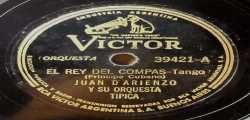





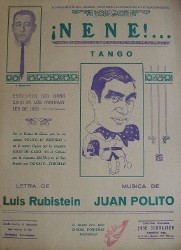

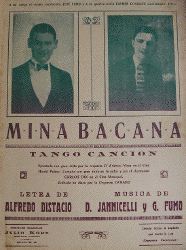

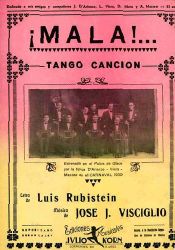

 "Chirusa" was also played by the D'Arienzo orchestra in "Tango"
(1933), the first Argentinian feature-length sound film. We can see
D'Arienzo (left) still playing the violin. Watch the fragment on
"Chirusa" was also played by the D'Arienzo orchestra in "Tango"
(1933), the first Argentinian feature-length sound film. We can see
D'Arienzo (left) still playing the violin. Watch the fragment on 